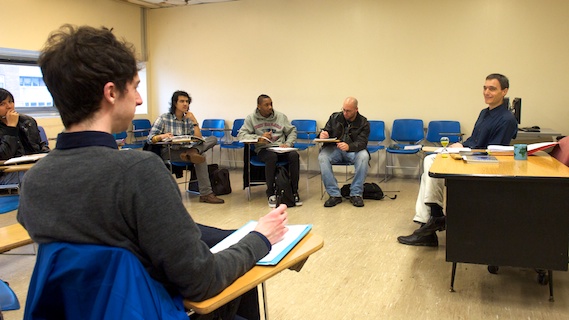
As it turns out, one of Professor Ally’s students was a half-second later for class than he thought.
The other students in Great Issues in Philosophy were responding to a question their professor, Matthew Ally had posed: What are potential problems with the belief that consciousness causes our actions?
One of them commented, “Our brain is always working with a half-second delay, so consciousness isn’t immediate,” and this brought up another question: Where do consciousness and matter come together?
The students considered these questions within a number of contexts: the work of René Descartes, “Quantum weirdness,” functionalism and other topics they’ve delved into, over the semester.
They talked about a study in which a neuroscientist applied stimuli to a test subject, interrupted that person’s neurological response, and concluded that the human brain perceives stimuli a half second later than it happens—and that’s when one student quietly entered the room and slid into his seat, not just a few minutes late, but 500 milliseconds more, on top of that.
Views on “seeing”
The class also spent some time formulating questions on the physical phenomenon of vision, approaching it from the point of view of a neuroscientist, a psychologist and a philosopher.
Occasionally guided back on track by Professor Ally, they grappled with each other’s questions, such as “How does internal perception relate to external reality?” and “What chemicals in the brain give us the perception of sight?”
They reflected on a biological experiment in which a frog’s eyes were surgically rotated 180 degrees, causing him to zap his tongue in the opposite direction to that in which a fly appeared. They marveled at optical illusions on handouts passed around by Professor Ally, noting how the brain sees something quite different from reality.
But wait—experiments on frogs, chemistry in the brain—is this a science class, or a philosophy class?
“You can’t do philosophy of mind responsibly in the 21st century without thinking about psychology and neuroscience,” says Ally.
Likewise, he explains, scientists “need” philosophers. “Three scientists use the term ‘free will’ and each means something different,” he says. “Philosophers help add concepts and valuable clarity to the scientific process.”
“Real” dialogue
Matthew Ally’s own work is interdisciplinary in that it relates to three areas of research: consciousness studies, sustainability studies, and the ethics of globalization.
A specialist in 20th-century Continental philosophy, he is known for his intense research on the humanist philosopher Jean Paul Sartre, and offers an environmentalist interpretation of Sartre’s work in his new book forthcoming from Rowman & Littlefield, A Case Study in Existential Ecology: Bringing Sartre to the Biosphere.
The Great Issues in Philosophy course brings students into that interdisciplinary conversation, “the interface between neuropsychology and cognitive psychology and philosophy; real dialogue between philosophers and scientists,” Ally says.
His student Eder Morales, a Liberal Arts major who hopes to earn a bachelor’s in philosophy someday, is excited by philosophy’s impact on the sciences and other areas.
“Philosophy changes the way we see the world and other people,” he says. “It gives us a new perspective emotionally, ethically, in the workplace, and politically.”
Philberth Allen, who is considering a major in sociology at Hunter College, says that studying philosophy “gives you important ways of thinking about how to address a problem. It delves into neuroscience and helps us dig deeper. For me, this matters because humanity will make scientific advancements related to the brain, and this helps that process.”
Philosophy’s impact
“Once I had a student who actually burst into tears at the notion that free will is an illusion,” says Professor Ally. “Not all neuroscientists think it’s an illusion, of course, but it’s a tough idea to ponder anyway. Same goes for the idea that the self is illusory. Again, it may or may not be, depending on your angle. But some students definitely get shaken up thinking about it.”
Being “shaken up” is ultimately, though, a positive outcome in his class.
“Students seem to really have a new sense of themselves, and come away not only with a sense of some of the surprising limits of human experience, but more importantly, with new wonder at its strengths,” he says.
“We challenge our intuitions about things like the self, free will, animal minds, artificial intelligence, and the like, and students come out with a better understanding of the richness of being human and of the world around them.”
Max Donnewald, a liberal arts major who wants eventually to major in French literature and creative writing at Hunter College, says he is appreciative of the class focus on contemporary philosophers “who are still alive and still developing their theories in the field.”
“Our textbook by Susan Blackmore has ‘practices’ that come with the chapters, questions intended to make us rethink our subjectivity,” he adds. “We’re applying philosophic ideas to studies in neuroscience, psychology, and later, we’ll apply them to evolutionary biology.”
Ayesha Azarcon is one of the few science majors in the class, and previously took an ethics course with Professor Ally.
“To me, this class is more interesting than the ethics course, because it’s a lot more puzzling,” she says.
“It gives me a sense that I’m progressing in my understanding of myself and of reality. In ethics, the conflicts are fairly clear, but in discussions of consciousness, there’s a lot more wondering.”
STORY HIGHLIGHTS
- In Matthew Allyâ¿¿s Great Issues in Philosophy class, students ponder the nature of consciousness
- They consider consciousness through perspectives of psychology and neuroscience, as well as philosophy
- Professor Allyâ¿¿s book, A Case Study in Existential Ecology: Bringing Sartre to the Biosphere, is forthcoming from Rowman & Littlefield

